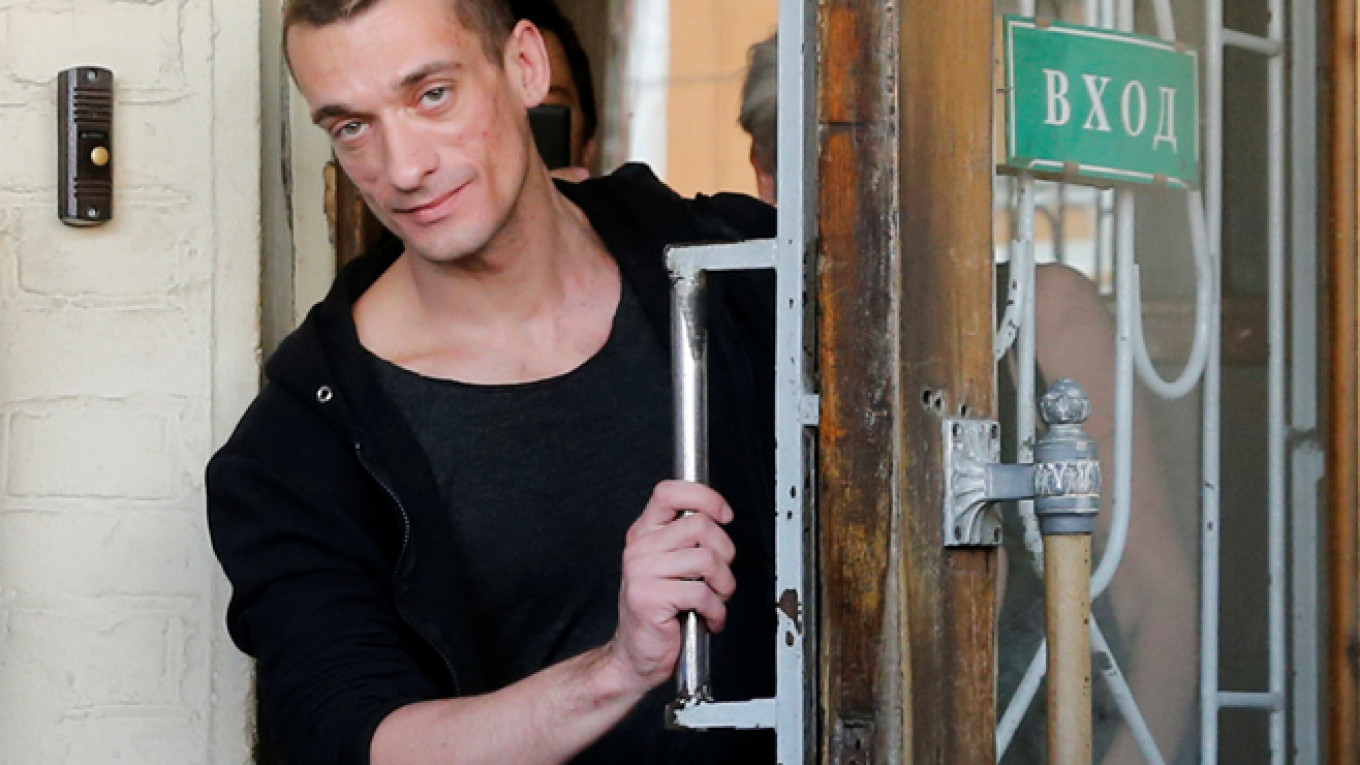In the end, he came out smiling.
Russia’s most radical political performance artist, Pyotr Pavlensky, had languished in jail for seven months after setting fire to the headquarters of Russia’s security services last year.
On June 8, a Moscow court set him free. Rather than impose a long prison term, Judge Yelena Gudoshnikova fined Pavlensky 500,000 rubles ($7,750) and ordered him to pay 481,000 rubles to compensate the cost of repairs to the building. Pavlensky was found guilty of damaging a cultural site, a crime which carries a maximum sentence of three years.
Outside, the 32-year-old Pavlensky thanked his supporters: “It does not matter how the trial ended,” he said. “What is important is that we were able to unmask, uncover the truth: the government is founded on the methods of terror.”
The Federal Security Service (FSB) building on Lubyanskaya Ploshchad in central Moscow has long been feared. It headquartered the Soviet secret police — first the Cheka, then the KGB.
In the dead of night last November, Pavlensky doused the building’s massive wooden doors with gasoline and set them on fire. He then posed in front of the flames for photographs, dressed in a hooded jacket and holding the gas canister. Within minutes, he was detained.
Pavlensky called the action “Threat. Lubyanka’s Burning Door.” It was the latest in a series of performances to protest mounting repression of civil society in Vladimir Putin’s Russia.
Previously, he had staged a miniature reenactment of Kiev’s Euromaidan protests in St. Petersburg, complete with burning tires; and he nailed his scrotum to the cobblestones of Red Square to illustrate “the apathy, political indifference, and fatalism of Russian society.”
Many expected the state to imprison Pavlensky, following the example of punk-rock group Pussy Riot, two of whose members were jailed for two years after a performance in a Moscow cathedral in 2012.
In fact, it was Pussy Riot that transformed Pavlensky. His outrage over the jailing of Pussy Riot members prompted his first action, in which he sewed his lips together with thick, red thread.
Pavlensky’s use of his own body has made him a unique figure in Russia — an uncompromising dissident for the Putin era. “Pavlensky is our eyes, hands and conscience,” Pussy Riot’s Nadezhda Tolokonnikova earlier told The Moscow Times.
In Russia, however, where non-conformism is widely mistrusted, many viewed him as unhinged.
His performances did not stop at the courtroom door. He has turned his trials into a farce, and refused to testify during the trial or stand for the judge. While his lawyers have worked to free him, Pavlensky himself repeatedly demanded that he be charged for terrorism, echoing the case of Ukrainian filmmaker Oleg Sentsov, who was sentenced to 20 years for terrorism after he set fire to a the office of a pro-Kremlin political party in Crimea two years ago.
Memorably, Pavlensky provoked prosecutors to argue that the security services building was a cultural site by virtue of the hundreds of “outstanding cultural figures” imprisoned and tortured in its cells. It is unclear whether prosecutors were knowing participants in the performance.
Wednesday’s court decision may have freed Pavlensky, but the confrontation continues. The artist, who lives in a single room apartment in St. Petersburg with his partner and two young children, said he would appeal and refuse to pay the fine. He asked his supporters not to pay on his behalf — a move that could again land him in jail.
After the ruling, Tolokonnikova tweeted: “Pavlensky has proved that you only win if you never compromise.”
Pavlensky was more circumspect. He said the state had freed him “because it suits them — to show a hypocritical humanitarian face.” He gave no reassurances. “I don’t know what comes next,” he said. “I don’t make plans.”
But he did have a message: “Thank you,” he said, “to those who weren’t afraid.”
Contact the author at p.hobson@imedia.ru. Follow the author on Twitter at @peterhobson15
A Message from The Moscow Times:
Dear readers,
We are facing unprecedented challenges. Russia's Prosecutor General's Office has designated The Moscow Times as an "undesirable" organization, criminalizing our work and putting our staff at risk of prosecution. This follows our earlier unjust labeling as a "foreign agent."
These actions are direct attempts to silence independent journalism in Russia. The authorities claim our work "discredits the decisions of the Russian leadership." We see things differently: we strive to provide accurate, unbiased reporting on Russia.
We, the journalists of The Moscow Times, refuse to be silenced. But to continue our work, we need your help.
Your support, no matter how small, makes a world of difference. If you can, please support us monthly starting from just $2. It's quick to set up, and every contribution makes a significant impact.
By supporting The Moscow Times, you're defending open, independent journalism in the face of repression. Thank you for standing with us.
Remind me later.






